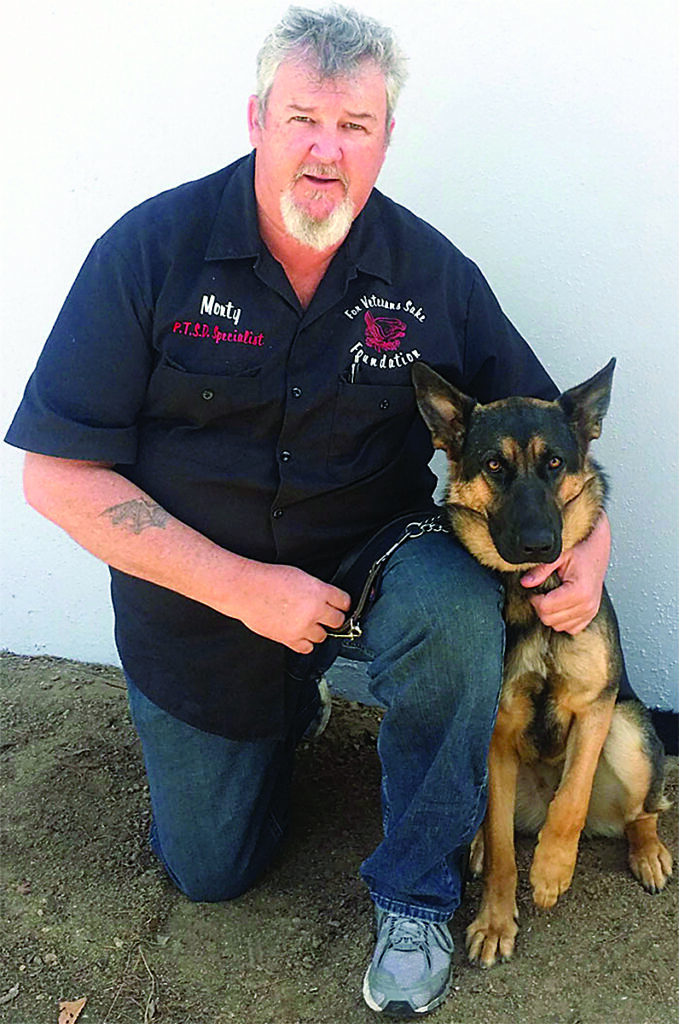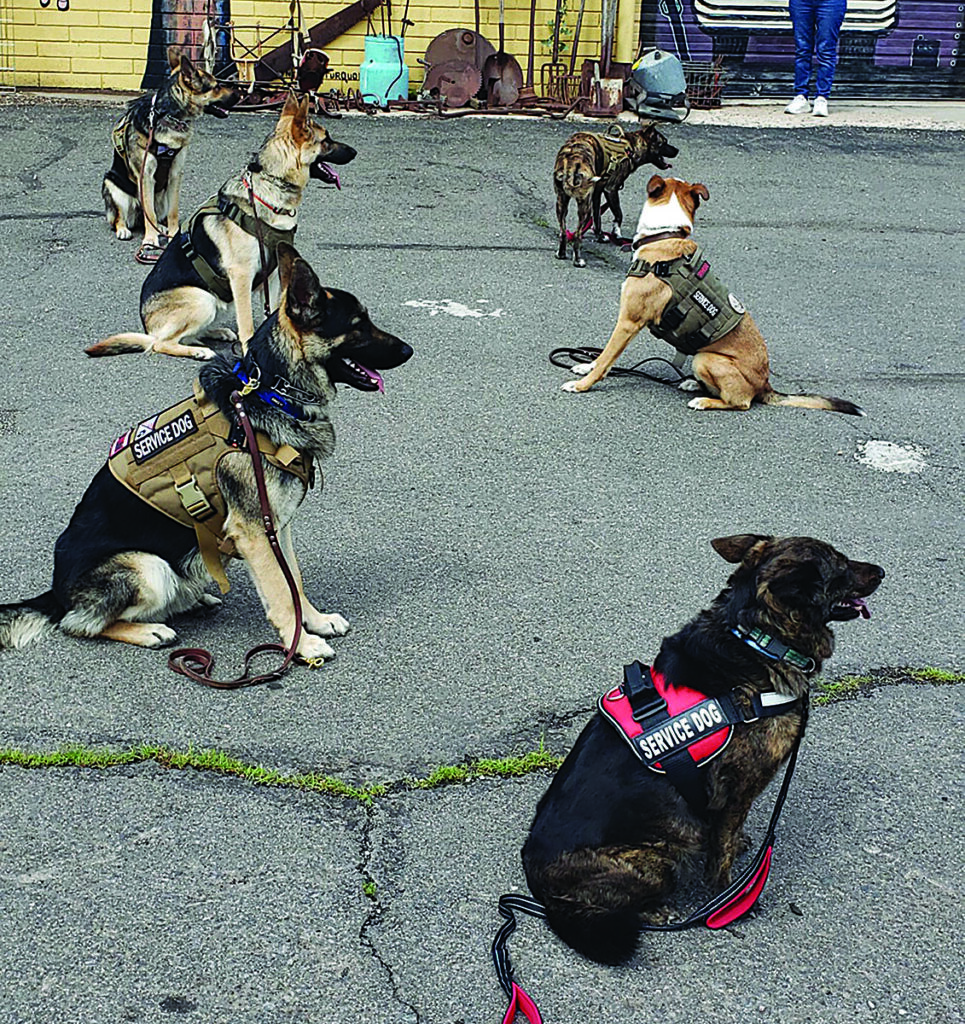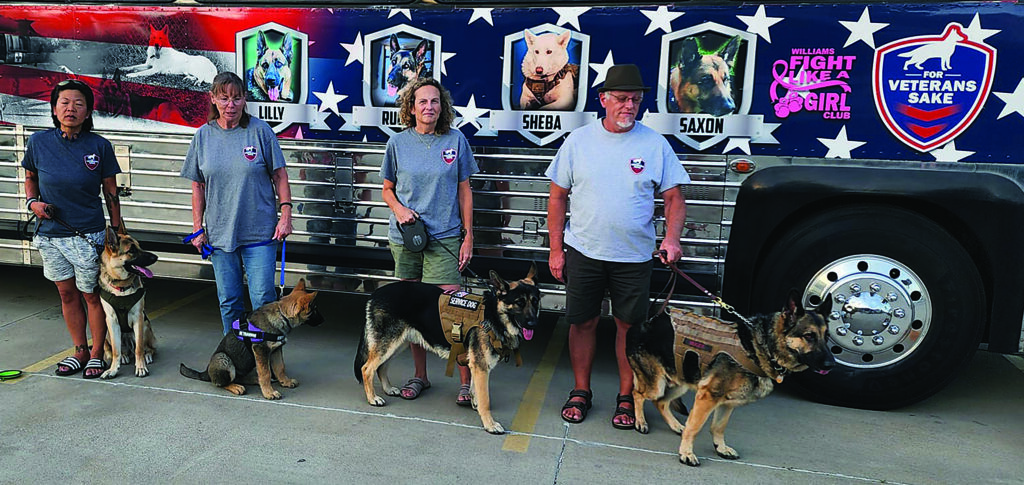By Heidi Dahms Foster
A Northern Arizona man with a passion for veterans and dogs has found a way to help both.

Monty Hutson served in the Army in Germany for six years, in the 101st Airborne and 8th Infantry. When he returned to the U.S., he started a successful company in Los Angeles. He always had a passion for helping veterans, however, so he eventually sold the company and founded the For Veterans Sake Foundation, pairing rescued dogs with veterans and first responders with PTSD.
Hutson spent more than 30 years counseling veterans, and saw the benefits service dogs provided. He was a skilled dog trainer, working with hunting, tracking, and search and rescue dogs. He became frustrated with the money it cost and the time it took to provide a dog to a veteran or first responder, so he began pulling dogs from shelters and training them as service animals. For Veterans Sake Foundation, a 501c3 organization, has been in operation since 2014, and has trained and placed more than 250 dogs with veterans and first responders.
“We always seek our dogs from the shelters, a ‘life for a life,’” Hutson said. “We go and look for a dog of the same character to pair with the person we are working with. We look at their demeanor in the runs, to see how they respond to other dogs around them, and test them. Then we take them out of the run and work one-on-one. The veterans get the dogs almost immediately, and we start working with them. The veteran has to come to training with the dog every week.
“There are too many good dogs sitting on death row waiting to be part of someone’s life. Some veterans and first responders with PTSD are waiting to re-engage in life. It’s no problem to go to shelters and work with them to pull dogs. It’s very simple and direct, and our services are absolutely free,” Hutson said.
He said the Foundation pairs the dogs with veterans depending on their needs. Many veterans, he said, isolate themselves and never want to be seen or heard. “We push them a bit, make them do things to care for the dogs. If the dogs’ natural ability works with the veteran’s needs, that’s the one we’ll pull.
“(Placement) depends on the situation,” Hutson said. “We listen to the vets. We have to be able to place a dog with them that will help them progress in their situation, or we won’t provide the dog,” he said. “We’re here for people who are serious about continuing to train for the rest of their lives. There are always new situations and new adventures.”
Other requirements for the service dogs are that they are more than 20 pounds, and must have the ability to pass a Good Citizen test. Hutson has found that the smaller dogs sometimes don’t have the needed attention span. The breed or mix of the dog doesn’t matter, but Hutson steers clear of dogs with aggressive temperaments.

The For Veterans Sake facilities used to be in Texas, but Hutson did not find enough support there for the organization. He is now based with his crew in Williams. “We worked with a lot of people in Texas, and we still stay in touch and work together.”
For Veterans Sake is supported by private donations and fundraisers. The organization operates with a minimal staff and dedicated volunteers. “Our staff and volunteers will go through hell and back for me. When they see what we’re doing with the veterans and dogs, the outcomes motivate them more,” Hutson said. “It’s a great team, and no one is above anyone else. They just like the dogs and they want to work together.”
Hutson has several of his own dogs that are important to his work – three German Shepherds named Ruger, Lilly and Saxon, and a full white wolf named Sheba. Lilly is trained to identify when another dog in training is having issues. “She’ll move off that sideline and correct the dog and go back. Ruger just likes to play around and strut his stuff. Sheba likes to sit on the sidelines, but she’ll stir things up with her wolf smell. Some other dogs see her as a predator animal, and it’s a good way to test them and see how they will respond.”
While he was in the military, Hutson had a program training wolves. He worked to show that the animals have a sense of smell so accurate that there is great use for them. He obtained Sheba in northern Arizona. She is now trained to detect seven different cancers with 93 percent accuracy. Lilly is also trained in cancer detection, heart and thyroid issues. In Texas during a fundraiser, Lilly was fast asleep. A woman walked up and Lilly alerted. Hutson spoke with her and told her that the dog was trained to detect those health issues. The woman told him that she had just left the doctor’s office and had been scheduled for bypass surgery.
For Veterans Sake has a donated tour bus and a motor home that are used to take the program to veterans that cannot come to them. Appointments can be scheduled in the Phoenix area, Nevada or Utah. “We just set up for a long weekend and bring our volunteers,” Hutson said. “If they can’t make it to us, we can show them how to train their dogs and get on the right path. That way we can reach more vets.
“We’ve had so many great stories,” he said. “One lady in Texas had seizures and she didn’t know what to do. She had lost everything. Her partner came to see what we were about, and I said, ‘bring her over here and we’ll talk.’” We decided we could help her, and found her a dog at the Marshall, Texas shelter. It was the perfect dog for her. She came out to meet us, because I needed to see how she would work with the dog. The dog, Rimshot, got so good at detecting seizures he would give her a five-minute head start.”

The next time Hutson saw the woman and her dog, she told him she had not had a seizure in four months. “It has changed her whole life. She has re-engaged in life.”
Hutson’s passion for dogs and what they can do for veterans and first responders with PTSD shows through in everything he says and does. “Animals are just amazing, if we just listen to them. They are a lot more intelligent than we are.”
For Veterans Sake is a small organization with a big heart, Hutson said. “Our mission is to provide PTSD service dogs, and we’re very good at what we do. It’s one of the best jobs, to work with dogs day in and day out. We tell those who receive our dogs that training is every day for the rest of your life while you have the dog. When the dog gets older, you get another one and start all over – it’s a whole new thing. We work through the issues with each dog, and what you put in is what you get out.”
The more than 250 people who have received a For Veterans Sake dog still call to share their experiences and adventures. “They are engaging in society and producing, becoming a part of something again. It’s always good news to hear that,” Hutson said.
For more information about For Veterans Sake or to donate, visit their website at ForVeteransSake.org, or their Facebook page at www.facebook.com/www.forveteranssake.org.

